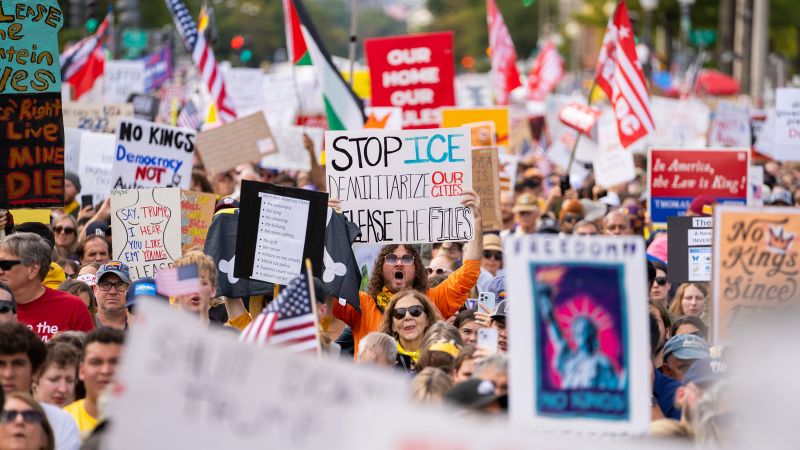Citizens Taking a Stand: A Birthday Protest in Washington, D.C.
On a special day marked by personal celebration and societal involvement, retired government worker Peggy Cole from Flint, Michigan, found herself at a crossroads. As she turned 70, an important movement was underway—the “No Kings” protests in Washington, D.C. Seeking to align her personal milestone with a greater cause, Cole and her friend Janet decided to embark on a road trip to the nation’s capital, eager to mark the occasion in a way that felt meaningful.
A Day of Significance
“I couldn’t think of a better way to celebrate it,” Peggy Cole remarked, expressing the urgency she felt to be a part of the protests. The decision was not taken lightly; it was infused with a sense of responsibility and urgency to voice concerns about the current political climate. For Cole, the protests signified more than just a moment in time; they offered an opportunity to amplify the voices of those who felt marginalized under the current administration.
The Feeling of Necessity
As she reflected on her choice, Cole stated, “I had to be here. We could’ve protested in Michigan…but this was special.” The double significance of her birthday and the protests fueled her determination to be present. This sentiment resonated not only within her but also among countless others who felt a moral obligation to stand against perceived injustices.
The Threat to Democracy
Cole’s concerns echoed a broader anxiety felt by many participants. “It seems to me,” she voiced emphatically, “(Trump is) taking our government, our democracy, and dismantling it piece by piece, slowly, but surely.” Her words underscored a sentiment shared by numerous individuals who believe that the core principles of democracy are under threat. She articulated a palpable fear that, without intervention, these issues would continue to erode the very fabric of American governance.
A Younger Perspective
The apprehensions were not confined to older generations. Elizabeth Nee, a 25-year-old social worker from Maryland, also shared her deep-seated worries. “I think our democracy is at risk, and I think that that’s extremely distressing, and that’s why we’re here,” she explained. This generational connection showcased how the stakes felt universal, affecting everyone regardless of age.
Real-Life Impacts on Vulnerable Populations
Nee’s profession has brought her face-to-face with the consequences of political decisions. Working in a psychiatric hospital in Baltimore, she observed the rising influx of vulnerable individuals: “We have a lot of people who are coming in and they’re unhoused, a lot of people on Medicaid. Everything’s at risk right now.” Her experiences illustrate the real-world ramifications of governmental policies, particularly as they pertain to mental health services and social support systems.
Concerns for Mental Health Support
Her commitment to her patients added an emotional layer to her protest. “He’s tearing apart anything that has to do with supporting mental health, which is the field that I work in,” Nee lamented. This connection between mental health and national policies highlighted the urgent need for systemic support, adding another dimension to the day’s protests.
The Power of Collective Action
Both Peggy Cole and Elizabeth Nee embody a powerful narrative of civic engagement and moral responsibility. Their presence at the protest serves as a reminder that activism often transcends individual concerns; it’s a communal effort aimed at safeguarding a shared future. On the day of Cole’s birthday, the air in Washington, D.C., buzzed with the collective hope that change is not just possible but necessary.
The “No Kings” protests not only marked a pivotal moment in the activism landscape but also illuminated the intertwining of personal milestones with social justice. Each voice contributed to a chorus demanding accountability and change, reinforcing the idea that every act of protest, big or small, plays a role in the larger tapestry of democracy.



